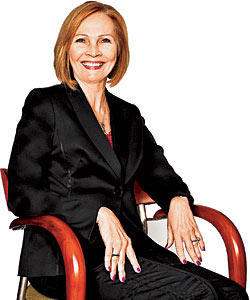Interview conducted and condensed by Jeff Bailey

Word around the courthouse is that your empathy for battling spouses comes from your own rocky childhood—that both of your parents were married and divorced a few times.
It’s true. My childhood was training for the job. There has been a lot of family upheaval. I left the bench before turning 60—I took a hit on the pension—but I felt that mediating these cases was the right way to go. If you go to court, it’s the judge’s decision, and you have to live with it. Judges have good days and bad days, like everyone else. To me, it’s so important that people make their own decisions.
Most people I know who have gone through a divorce said they wanted it to be friendly, but they ended up snarling by the end.
Mediation seems a gentler path. How often are divorces mediated in Cook County? You have to use a mediator if you can’t agree on child custody. But on finances, less than 1 percent are mediated.
How does mediation work?
We start out in separate conference rooms. Then I move [the spouses] to a shared room as fast as I can. A typical mediation takes 16 to 20 hours, spread over a few meetings. We settle on the kids first. The kids are most important. Plus, how the kids are dealt with affects the money.

According to Shields, in her courtroom, about one-third of the criers were men. In divorce mediation, “it’s more like half.”
What is the worst thing divorcing couples do?
Use their children. They might as well pick them up and bash their spouse with them. A fraction of parents called unfit [by a divorcing spouse] actually are.
A prominent divorce lawyer who recommends you as a mediator also says divorces in which only one spouse has command of the financial information aren’t suited to mediation. True?
No. It’s the mediator’s job to keep control equal. Knowledge can be dealt with. Financial advisers and attorneys can come to mediation sessions. And everyone needs a lawyer—at least to review the agreement.
What do you charge?
$450 an hour. I’m half the price of two attorneys.
What are your typical clients like?
Upper-income people like mediation [in part because] they like the confidentiality. But the middle class really needs it for financial reasons. Money gets eaten up. Houses—they’re all underwater. It used to be, “I want [the house].” Now it’s, “You take it.”
What is your strategy for getting couples to agree?
In mediation, I can often see the path they should go, but they need to discover it themselves. People don’t settle until they’ve gotten through the emotional process. While it’s me leading the process, it’s their process.
Sounds like psychotherapy.
At the end of the day, I’m exhausted because I’ve taken in all the couple’s emotions. Some days I’m catatonic. I need one glass of white wine.
Photograph: Bob Stefko


